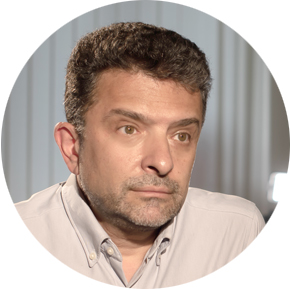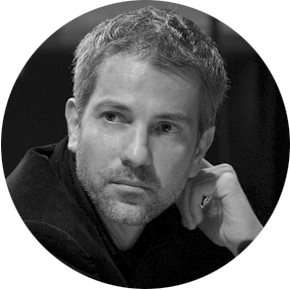Interview of writer Alexander Arkhangelsky with Mediamax
In spring you announced about launching a new project with Tatyana Sorokina and about raising funds “for a future film about a Sardinian who became a Russian hieromonk and an expert in the ancient Armenian church, and about where one’s Homeland in the world of the new nomad is.”
It is Father Giovanni (John) Guaita. He is an expert in the ancient Armenian church, and he interviewed Catholicos Karekin I. I really hope this book will be republished, because it is an amazing book.
Of course, it will not be a tourist film. We will get on a plane with him, travel here, and look at Armenia through his eyes as a country that has learned to maintain the sense of Homeland across all borders, dropping out of history, returning to history.
There are times when emigration is useless and times when it is useful. What does useless mean? It is when people simply save themselves and do not integrate into the cultures of the surrounding countries: either they dissolve in them completely, or begin to preserve everything completely, as it was in their Homeland.
Russia has entered a dramatic period - this is a new wave of emigration, and mass emigration in one stratum. If you count on 140 million inhabitants of Russia - it is still bearable, but it is emigration in one stratum, in one circle, in several major cities, and of course, these losses will be very tangible.
Those Russians who have come to Armenia over the past 1.5 years, in a good way, level out the problems that exist today in relations between Armenia and Russia, the problems that have become obvious after the 2020 war. To simplify, has something deteriorated in relations between Armenia and Russia?
Which Armenia and which Russia are we talking about? About political Armenia and political Russia?
First of all, yes.
A lot has changed. And dramatic changes are still taking place today.
It is obvious that Armenia is discussing a tragic option for itself. Perhaps what we see - a negotiated option - is politically necessary, I do not know, I am not a politician. But from a cultural and historical point of view, this is a tragic option for Armenia. What the negotiators propose to Armenia - the choice of reconciliation after what happened, is a tragedy.
It is not for me to give advice on what is right or wrong. I am just compassionate. This is the only possible position from the outside. Russia, of course, played and would still like to play a big role. It tried to play some positive role, but then it simply had no time for Armenia. Armenia was left to the mercy of fate, alone with the war.
But as soon as Western players appeared, able to take that negotiating position, Russia immediately began to return.
I felt resentment in people, it felt like a betrayal. I often visit Armenia, talk to people a lot, and I do not know if there is such love for Russia and Russians anywhere else. Now I am not speaking about politicians, but about people, about communities.
The Russian position is first dictating its interests too harshly, then stepping aside, not wanting to consider interests of Armenia. People outside the political field have felt this. Human destinies are the third aspect. Armenia has opened its doors to a huge number of Russians. It would be unfair if the Russians who have found refuge in Armenia will not respond to this with not just love, but solidarity and all they can respond with by being here and now, testifying before the world about the troubles Armenia is facing.
I do not think there has ever been anything like this before – extremely hard political divergence and extremely close convergence of human destinies: two processes on which we are now swinging like on a seesaw.
Since you often come here, do you have an understanding: does Armenia know what it wants?
I know that Armenia knows what it does not want. It does not want more war, it is tired. There is still heroism, and we know examples of this incredible heroism, but I have a feeling that the country is tired of the state of war. What it is ready to do to make sure there is no war, I do not know, I will have to accept the choice that Armenia will make.
But Russian politicians must firmly say where their interest lies. They must decide for a long term, not immediately, regardless of what elections are coming up, what elections have taken place, whether “environmentalists” appeared in the Lachin direction, or disappeared.
After February 24, 2022, Russia simply “gave up” on this process - forgive me for not a very nice word, but it is true. Was Russia engaged in the Armenian “plot” after February 24, 2022? I have a feeling that it was not, but then, feeling that the West came as a new negotiator, it decided to return quickly, to interfere with the West, but whether to help Armenia - I do not know.
In 2009, you wrote: “What should we prefer: habitual but proud stagnation in the very important but strategically unpromising myths of the 20th century or a change of cultural fate? A change of fate, or a conversion of centuries of history into modern realities? Closure in a provincial identity or playing ahead of history - without losing memory and identity? In this sense Russia and Armenia, for all their differences in scale and reality, are in the same phase. It is a dramatic phase. And a key one. Here and there, we are caught between our homebrew and our aspirations for a future that cannot be realized outside the space of world civilization, where we all want and need to go, where we seem to be enticed, but where they do not really wait for us.
Unless we know that you wrote this 14 years ago, it may seem that it has been written these days. Do you see any opportunities for a new rapprochement between Armenia and Russia in the political sense?
- I can look at the situation through the eyes of Russian politicians: “we would rather deal with the knot that we have tied and cannot untie, we are in a state of half-decay, we risk losing the unity of our country, well, what role can we play?”
Of course, Russia wants to keep control of this part of the earth – I am now calling things by their proper names. But we cannot put military, economic, or political resources into it. Armenia is a small country, it needs to understand with who it interacts, who is a strong supporter and who is a weak supporter, and who pretends to be a supporter. Of course, Armenia will maneuver, and this maneuvering will cause even more irritation and rejection among Russian elites.
I do not believe in rapprochement, except in the field of culture. In the field of science, humanitarian projects - I do, in political - I do not.
Is it realistic to expect that in conditions where there is no normal interaction between political elites, contacts between people can maintain some level of relations? Relatively speaking, if Russia, the Russian leadership decides to turn its back on Armenia, it seems to me that no cultural contacts will be able to influence this decision.
If I believed that political processes and political elites are eternal, I would totally agree with you. But they change. And that’s what I am hoping for. Cultural, human contacts by themselves will not solve anything, and have never solved anything during history. But they can save the ground for a future reversal. And this elite will be gone. Everything will change. The question is whether these contacts will remain, whether these knots will remain. I am a cautious optimist as far as the grassroots are concerned, and a total pessimist as far as the top is concerned.
Ara Tadevosyan spoke with Alexander Arkhangelsky
This interview was prepared as part of a joint project with the Tufenkian Foundation





















